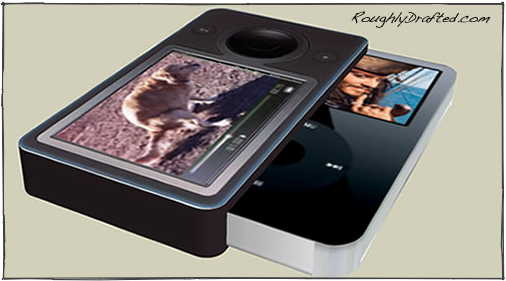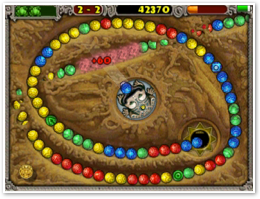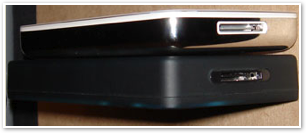
Ten More Myths of Zune
What’s more fun than dissecting the overwrought failures of big dumb companies whose marketers ineffectually tried to put a price tag on cool? Doing it in real time, as it happens!
Ten iPod vs. Zune Myths took apart the marketing spin attached to Microsoft’s upcoming iPod Killer, but there’s plenty left to examine. Here’s a look at the whimpers of jilted executives, painful marketing drivel and fan speak, the geeky in-jokes, as well as the market realities and technical problems facing everyone’s favorite iPod Killer.
Ten More Myths of Zune
Myth 1: Microsoft's iPod killer is ... Zuma.
A growing contingent of online technorati have taken to calling Microsoft's iPod Killer the Zuma. This might be funny on Slashdot, but is probably not so hilarious to PopCap Games, who have been selling an arcade game under the name for years. It’s even an iPod game. There’s no Zune-Zuma, because Zune doesn't play games.
 Zuma is also the brand name of a tiny Yamaha scooter. I spotted Zumas all over Thailand and Laos. The noisy rattletraps frequently crash, which may be the real punchline behind the Zuma in-joke.
Zuma is also the brand name of a tiny Yamaha scooter. I spotted Zumas all over Thailand and Laos. The noisy rattletraps frequently crash, which may be the real punchline behind the Zuma in-joke. However, before attaching Microsoft's Hindenburg to the fine products of PopCap and Yamaha, consider a slightly less destructive alternative: Zima, the ghey beer.
Also known as candy beer, Zima is the decade old, lemon flavored beer byproduct made by Coors. Zima is already a maligned product and the butt of more jokes than its similarly transparent contemporary, Vanilla Ice.
Like Microsoft's iPod Killer, Zima is a recycled version of an existing product with new marketing and an injection of artificial flavor designed to appeal to children with no taste.
Michael Robertson, the founder of MP3.com and the Linux distribution formerly known as Lindows, jumped into the fray by predicting that Microsoft's Zune would be "the biggest flop of 2007." Wow, bold prediction! What's next, prognostication that the $600 Sony Playstation 3 will be too expensive?
Robertson continued, "I've been looking for a good verb to describe losing all of your music to DRM [...] and I think I have one: zune."
After getting beat up by Microsoft over the use of Lindows, Robertson has a clear motive for taking a swing at Microsoft, but no, we don't really need a verb to describe losing music to DRM.
Besides, the verb form of Zune is not zune, but rather squirt, as has already been made abundantly clear by Steve Ballmer in his infamously disturbing interview in BusinessWeek that evoked horrible images of brown Zunes squirting all over each other:

"Guys who can touch us in multiple places probably matter more than guys who can touch us in any one place.”
“I want to squirt you a picture of my kids. You want to squirt me back a video of your vacation. That's a software experience."
Zunes squirt, and don’t you forget it Robertson, or there might be a chair headed your way.
Myth 3 : The Zune isn't just another poorly constructed piece of crap.
Actually it is. As thick as a book and just as boxy. The display isn't flush with the case and its plastic is cheap looking, in stark contrast with the tight fit and finish of the iPod it purports to be competing directly against.
Did Microsoft run out of money developing this thing, or does it think a cheap looking product would make a great first impression?


The only way this could kill the iPod is by swallowing it whole, which it certainly has the girth to do. The 30 GB Zune is even significantly larger than Apple's 80 GB model. This scale model rendering done in SketchUp compares the Zune’s dimensions to the 30 GB iPod; the photo below compares it to the 80 GB iPod.
Apple needs sharp competition from Microsoft in order to drive it to make increasingly better iPods, but sadly, the Zune just looks like another cheap, crappy WinCE box.
Myth 4: Microsoft can work out their iPod Killer's kinks over the next few years.
Microsoft has a history of throwing out unfinished software and working to fix it later. This can work well in software, which is commonly sold and then fixed after the fact.
In reality, nearly all software products need at least a few minor revisions before they can be considered refined and fully functional, and today it's common to label software as 'beta' in order to lower initial expectations.
However, in hardware this doesn't work. Apple first discovered this with its ill fated Apple III. Rushed to market in 1983 to compete against the new IBM PC, it was so poorly designed that even Apple couldn't sell it.
 After a bumbled rollout and a public relations disaster resulting from its numerous hardware problems, Apple released the revised Apple III plus, accompanied by an ad campaign that asked, "Allow me to reintroduce myself!" Nobody did. The "III" moniker was so tainted Apple couldn't use it again for a decade.
After a bumbled rollout and a public relations disaster resulting from its numerous hardware problems, Apple released the revised Apple III plus, accompanied by an ad campaign that asked, "Allow me to reintroduce myself!" Nobody did. The "III" moniker was so tainted Apple couldn't use it again for a decade.Microsoft doesn't have the luxury to ship an unfinished hardware product and sort things out afterward. Unsold hardware quickly becomes obsolete and has to either get written off and recycled, or dumped into the market at a loss, which then poisons the market for a successor. 

First impressions are key. Sega didn't get a second chance to debut the Dreamcast, Sony didn't get a second chance to premier its games lineup for the PSP after a lackluster introduction, and Apple didn't get the opportunity to reintroduce the Power Mac G4 Cube after its high price tag and unimpressive performance drew snores from Mac buyers.
Recall that those three products weren't at all regarded as junk, and had lots of eager fans. That still didn't make them wildly successful or allow their manufacturers the opportunity to fix the initial launch problems mid-flight after they began to lose altitude in the marketplace.
After blowing up on the launch pad, Zune won't get a second chance to try again any more than the Titanic, Hindenberg, or the Challenger Space Shuttle. If Microsoft thinks it will be able to live down an initial poor introduction by squirting out Zune 2007 service pack 1, it's been drinking too many lemony Coors.
As the original Xbox and the recent scourge of Exploding Battery Panic demonstrate, fixing hardware after the fact is an expensive mistake to make in the consumer electronics space.
Myth 5: Microsoft can afford an extended failure.
Certainly Microsoft as a company will survive a Zune failure; it's certainly survived a decade of WinCE and related failures. However, with the Zune, Microsoft faces the problem of establishing a pattern of failure in consumer electronics that will be difficult to reverse.
Creating an established pattern of success is difficult, but critically important to building a bankable reputation. Many companies have recovered from big failures, but after a series of failures, they lose their previous reputation and gain a new one for incompetence.
 Microsoft has already repeatedly failed: Vista is years overdue, Window XP is plagued with bad press over spyware and viruses, adware and architectural flaws, and the company's consumer electronics efforts have gone nowhere. It can't afford to sleepwalk through another product introduction.
Microsoft has already repeatedly failed: Vista is years overdue, Window XP is plagued with bad press over spyware and viruses, adware and architectural flaws, and the company's consumer electronics efforts have gone nowhere. It can't afford to sleepwalk through another product introduction. The company can afford to lose a few billion dollars, but it can't afford to lose what remains of the company's reputation as a software giant with the ability to deliver products.
Every loser product Microsoft rolls out makes it harder to recruit new brains in the hotly contended battle for the brightest minds in the tech industry. Given the choice between industry darling Google and an increasingly incompetent Microsoft, where would smart people want to invest their future?
Microsoft needs to focus on things it can do well rather than create another a failed product introduction and a huge public relations disaster. It would be better off quietly doing nothing than creating another loud public boondoggle.
This Series










Wednesday, October 18, 2006





 Bookmark on Del.icio.us
Bookmark on Del.icio.us Discuss on Reddit
Discuss on Reddit Critically review on NewsTrust
Critically review on NewsTrust Forward to Friends
Forward to Friends
 Get RSS Feed
Get RSS Feed Download RSS Widget
Download RSS Widget





